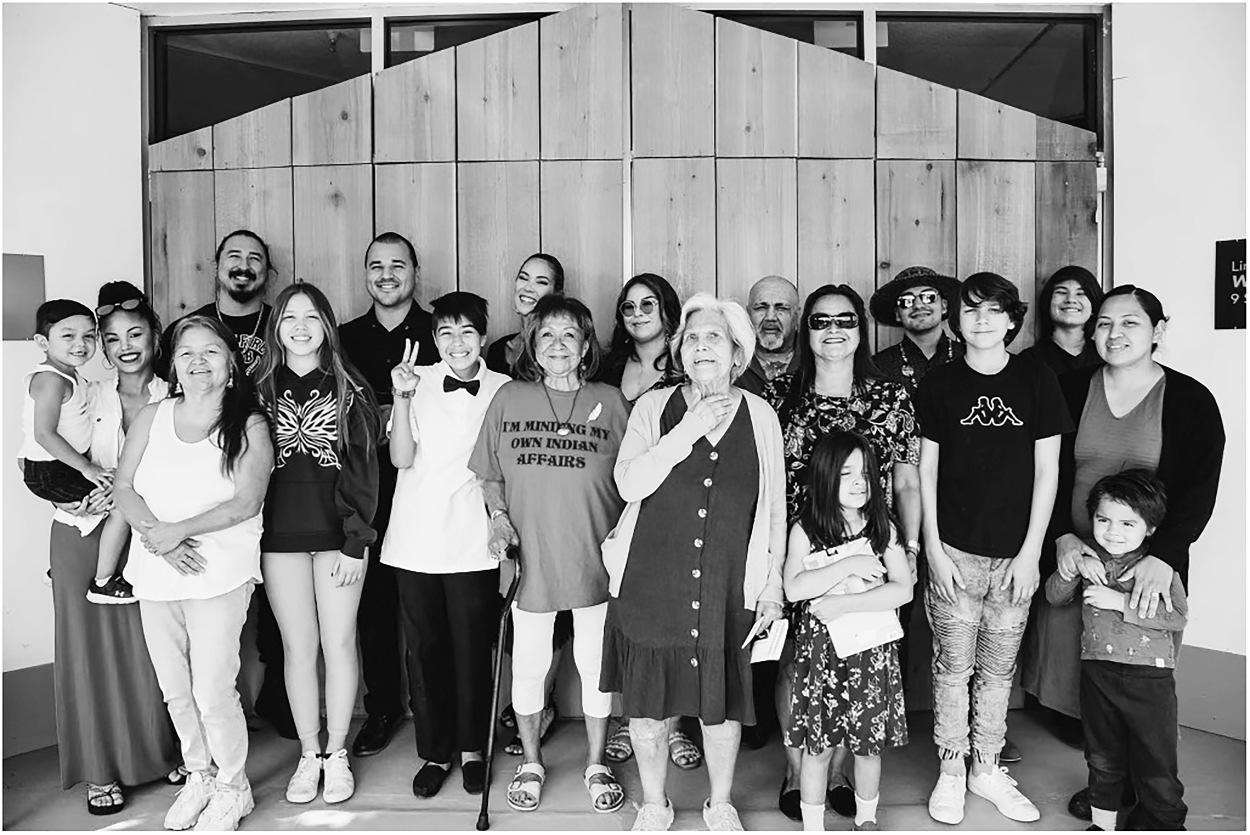
15 minute read
Joshua Watts solo art debut.........................................Pages
Submitted photos Nuu-chah-nulth artist Joshua Watts, back row, second from left, with his family in front of the longhouse he made for his exhibition at the Victoria Arts Council. A clay sculpture and two portrait masks (below) made by Watts are currently on display at the exhibit.
Joshua Wa s debuts fi rst solo exhibition in Victoria
Advertisement
Nuu-chah-nulth artist displays scuplture and prints, inspired by history, legends and traditional techniques
By Karly Blats Ha-Shilth-Sa Contributor
Victoria, BC - Informed by Nuu-ChahNulth histories, legends and traditional carving techniques, contemporary artist Ha’wilh Way’anis, Joshua Watts, has transformed the Victoria Arts Council’s main gallery to look like a longhouse as a way of honouring his cultural teachings, while commenting on current societal topics. The Victoria Arts Council is commissioning this work for exhibition, along with an artist book created by Watts with his partner, Kwakwaka’wakw poet and activist Linnea Dick. A collection of silkscreen prints, wood carvings and video by Watts will be featured with additional programming taking place in-person and online throughout the exhibition. The exhibit will run until Oct. 30. This is Watts’ debut solo exhibition. “Gifts from the Ancestors is a show I’ve worked my whole career to be able to present. It shares sculpture and prints that through my years of studying truly share my love for the art,” Watts said. “I titled the show Gifts from the Ancestors because the work I do and all Northwest Coast art are the gifts our ancestors give to us, and the future generations to help us in life and guide us on a good path in life.” Watts is a Nuu-chah-nulth and Coast Salish First Nations professional artist and cultural carrier. He was raised in Squamish away from his ancestral territories of Port Alberni and Lake Cowichan. “I am from the Tseshaht nation, and Tsuubaasaxt nation. I didn’t grow up in my communities but was adopted in the Squamish nation when I was young,” Watts said. “I now return home to Port Alberni every year and make sure to visit my uncles, aunties, nieces and nephews as much as I can. I also have a current project in Lake Cowichan with the museum to do a totem pole, which is on the traditional territory of the Tsuubaasaxt Nation.” When he was growing up, Watts had little connection with his ancestral culture, but after reconnecting, he realized the importance of culture and art. “I grew up without culture for most of my childhood. I started canoe racing in my early teen years and that’s when I was reintroduced to my culture,” he said. “I went home to Port Alberni every now and then, but it wasn’t until I received my traditional Nuu-chah-nulth name Ha’wailh Wayanis that I began to really take the time to learn my history, learn my genealogy and get familiar with my ancestors’ art.” Watts added that learning about his culture helped him through his healing journey. “Growing up my family had a really hard time. Because of inter-generational trauma, residential school and just general poverty, growing up was tough,” Watts said. “But whenever I participated in culture, or contributed to ceremonies, or just spent time on the land I could forget about the troubles in life. Culture really was a huge part of giving me my most cherished memories and valued life lessons. I highly encourage the youth to participate where and when you can and just remember your ancestors love you.” Watts has studied under renowned artists such as Ray Natraoro, Wayne Alfred, Corey Bulpitt, and Linda Lindsay, as well as the late Chief and master carver Beau Dick. Watts said growing up he didn’t consider himself an artistic person, but more of a jock, playing every sport he could. But he felt he was creative and art was something he always appreciated. “My mentor Ray Natraoro was the one who really introduced me to Northwest Coast art. We spent years together and when I moved in with him and his family I became a part of the family,” Watts said. “My style is infl uenced defi nitely by the many teachers I’ve had. I would say I’m known mostly for my traditional Nuu-chah-nulth art. I carve traditional and non-traditional wood pieces, paint, as well as make my own silkscreen prints. However, I am also experimenting with contemporary art which can be seen throughout the show.” Today, Watts has dedicated his practice toward youth development and mentorship programs and is an advocate for cultural revitalization amongst Indigenous youth and passing on traditional knowledge.
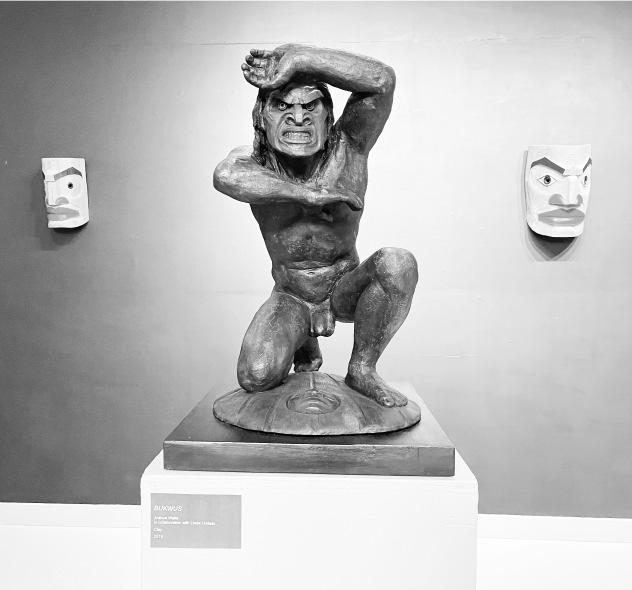
Page 12— Ha-Shilth-Sa—September 22, 2022 President’s message to Nuu-chah-nulth-aht
Hello everyone, hoping all is well with you, your families and communities and that your summer was fi lled with gathering food, enjoying the natural environment and spending time with family. The big world event the past week was the death of Queen Elizabeth at the age of 96 years. She lived a good long life and was loved by many. She was queen for almost 71 years. We send condolences to the family on the loss of a mother, grandmother, aunt and sympathies to the country on the loss of their queen. That being said, we recognize that for 71 years she was the head of one of the largest colonizers in the world. She was queen of 32 states at one point and of 15 when she died, which shows the extent of English colonization. We have all lived with the eff ects of colonization and many requests to Queen Elizabeth were made to make things right in Canada and she did not. Treaty nations in particular felt their numbered treaties were with the Queen, but she did not and left Canada to implement the treaties, which of course they have not. She has been aware of the impacts of residential school and her doing nothing to resolve the horrendous impacts on our people. There are Indigenous peoples who are angry with the Queen and will not observe the day of mourning, others have sympathy but what is important is people need to understand the dark times of colonization and how our development was delayed due to things like the Indian Act through the years. Her funeral was Monday, Sept. 19, which the prime minister declared a National Day of Mourning (this is not a statutory holiday but a one-time event). First Nations people are wearing orange shirts to mark the day, to always remember those that attended residential school and those that died and those still living with the eff ects of the school. We call on the new King Charles to work on getting rid of the Doctrine of Discovery as a way for Canada to claim our lands. We were here, and it was our land and that the colonizer arrived does not mean the land is theirs and they certainly did not beat us in war. We also call on the King to take action on supporting eff orts dealing with the negative impacts of colonization. I attended the grand Opening of Usma at their new building on 6th Avenue. They have made the space into a comfortable place to work. The day started off with the unveiling of two canoes that were commissioned for the use of youth in care. Designs were made by Georgina Haiyupis and are amazing looking. Curriculum will be developed around the importance of canoes to Nuu-chah-nulth as well as how to use them safely. I had lunch with David Eby, attorney general and minister of Housing, and Josie Osborne, MLA for the Alberni riding and minister of Land, Water and Resource Stewardship. The lunch was to meet David Eby, who is running for head of the NDP and would be premiere if elected. Other leaders were there, including Chief Councillors Brandy Lauder and Ken Watts, as well as Port Alberni Mayor Sharie Minions. We talked housing - lack thereof - and initiatives being worked on and clearly explained the needs here. We talked transportation and the need for improvements. We talked health and everything else that is impacting Nuuchah-nulth. We held a special directors meeting and Mariah Charleson was appointed the First Nations Health Council representative for Nuu-chah-nulth for a four-year term. The directors reviewed and accepted the audit. The audit was also be reviewed at the NTC AGM on the 19th for all the members. We have a Human Resource Committee where we have three directors and one alternate. One director from the Maa-nulth Nations. We have had a hard time getting directors to be on HRC due to their huge responsibilities. Our lawyer advises us we need to have directors due to all the legal liability. We reviewed that what is going to the AGM for consideration is that any director can be on the HRC whether they are ARFA or Maanulth. There has to be a vote to make this change to NTC constitution and bylaws. Our fi ve-year funding agreement known as ARFA is coming to an end as of March 31, 2023 and we must re-negotiate. This agreement is for eight Nuu-chah-nulth nations. Maa-nulth have their own funding agreements and Ahousaht has a 10year grant. There are changes coming in education and we have other funding priorities we must address. Also, our health agreement for 12 of our nations also ends on March 31,2023. We have had preliminary meetings with Directors concerned on what needs to be changed in these agreements. There will be a lot of work to be done on these two agreements. I continue to work on the issues around the Health Governance Committee and getting First Nations Health Authority to be more accountable to First Nations and to be community driven. I am also working on the gaming commission and working on getting more opportunities for First Nations in their communities. The province is also changing their gaming control act and we had input into their revisions. I also attended a one-day session of BC AFN on climate change plan and strategy. I was appointed to the BC First Nations Justice Council and will use this opportunity to help promote Nuu-chah-nulth issues in justice and work at an upper strategic level to change the justice system in the province according to the BC First Nations Justice Strategy. Remember that September 30th is the National Day of Truth and Reconciliation - formerly known as Orange Shirt Day. It’s a good opportunity to wear your orange shirt, bring attention to every child matters and educating people on the legacy of residential schools.
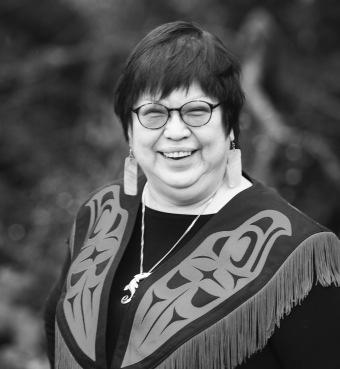
Respectfully, Cloy-e-iis, Judith Sayers
notice of annual general meeting
You are invited to the Westcoast Community Resource Society Annual General Meeting. Thursday September 29th, 2022. 7pm at Best Western Tinwis, Port Alberni. Option to join us online, please contact the admin@wccrs.ca or call @2507262343
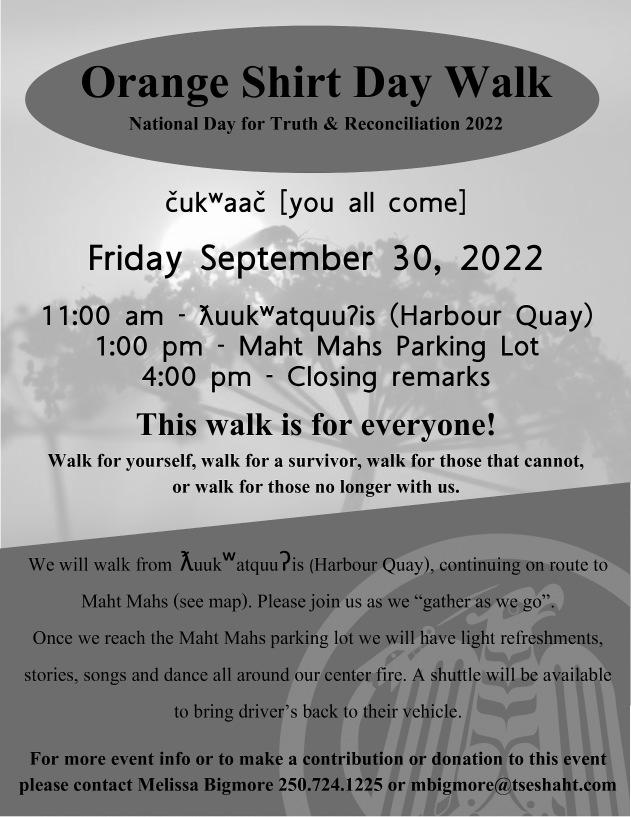
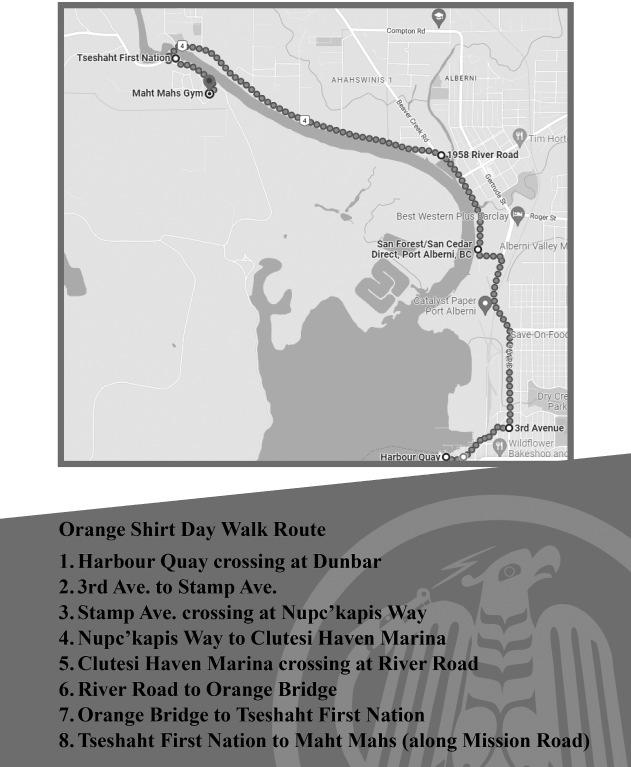
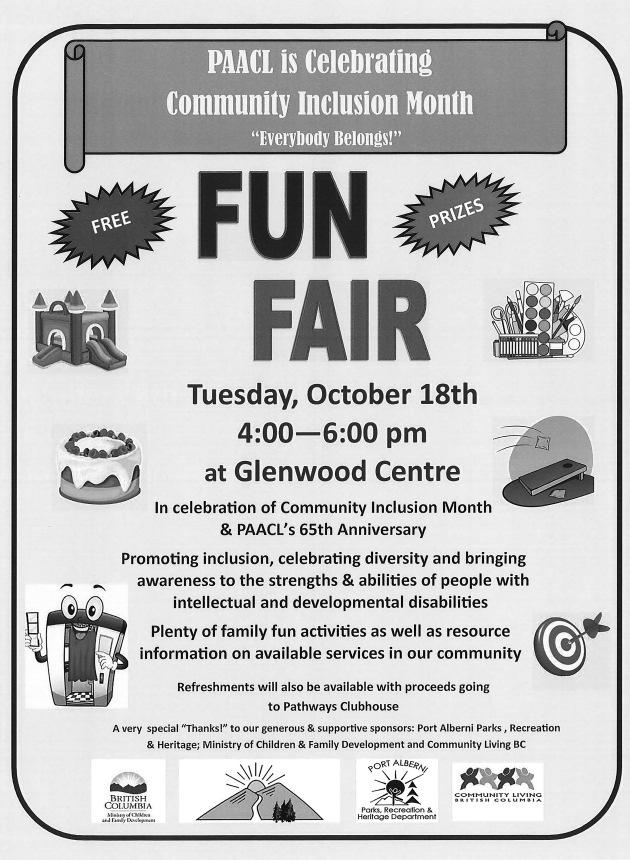
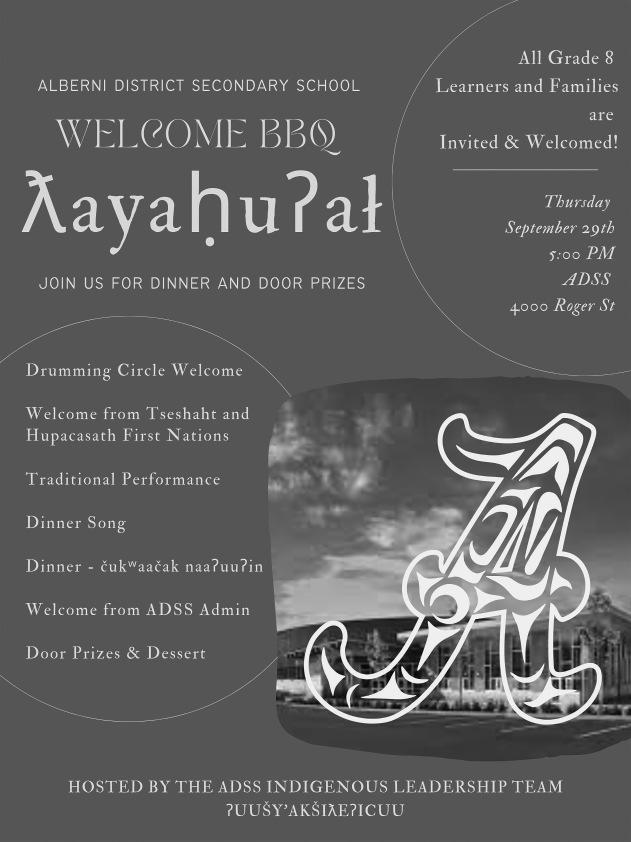
henna artist
By Aleesha Sharma
Port Alberni Friendship Centre Volunteers Needed
Need work experience? The Port Alberni Friendship Centre is looking for interested applicants for various positions. Call 250-723-8281
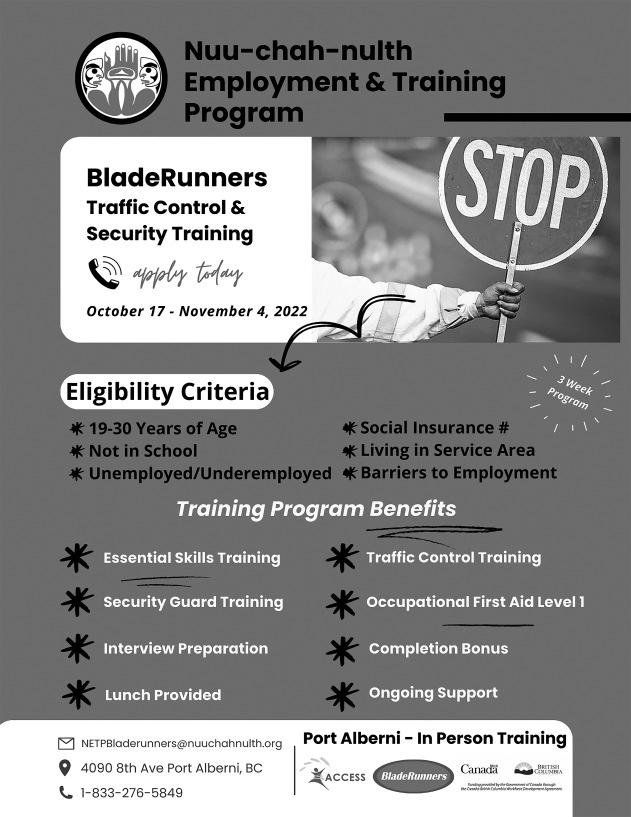
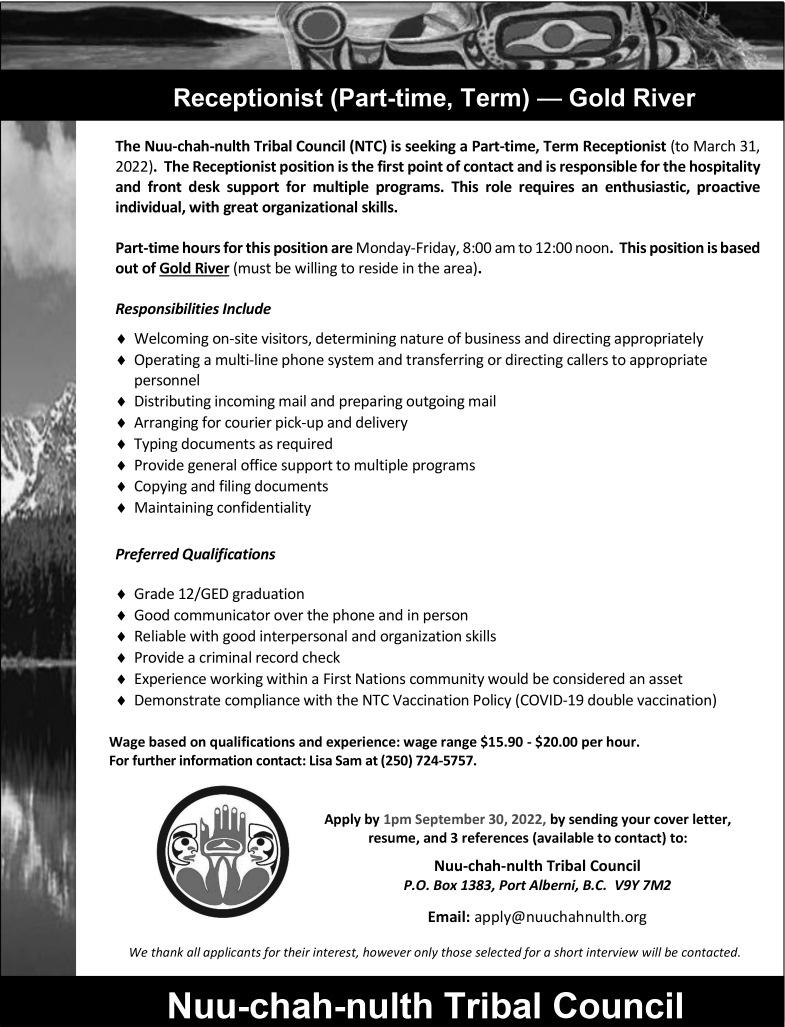
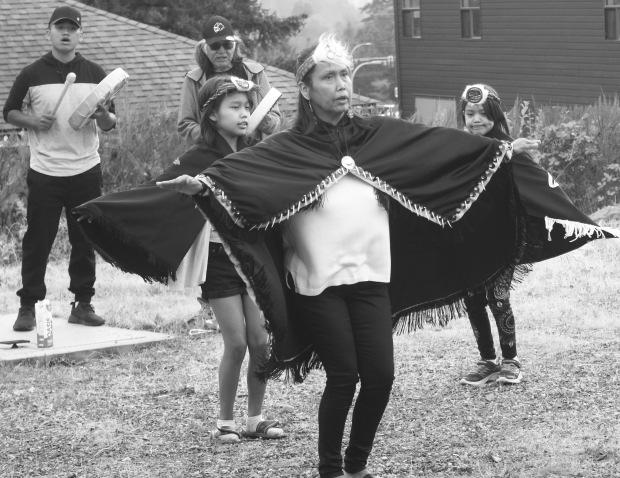
Photo by Konnar Oliver The annual event at Vancouver Island University began with an Ahousaht performance (above), as well as a presentation led by Wally Samuel (below).
VIU Nanaimo campus holds All-Nations Feast
Nuu-chah-nulth, Kwakwaka’wakw, Métis and Coast Salish all give performances to start out the year
By Konnar Oliver Ha-Shilth-Sa Contributor
Nanaimo, BC - Vancouver Island University (VIU) hosted its annual All-Nations feast at the Nanaimo campus yesterday, featuring dancers and speakers from the Nuu-Chah-Nulth, Kwakwaka’wakw, Métis, and Coast Salish, representing all four Indigenous groups from the Island. Jennifer Christoff erson is an Education Advisor in Services for Aboriginal Students, who says that after this many years, organizing the event is like a welloiled machine. “We’ve kind of got it down to a seamless thing, because we’ve traditionally cooked food and stuff . And so, we’ve actually farmed it out to the Serauxmen so that we actually give a donation and that goes on in kind back to the community,” explained Christoff erson. “So that part is easy. And then it’s just the logistics of the offi ce of Indigenous Education and Engagement Services for Aboriginal students. We all kind of team together. And we also do outreaches to other people to see if they can help and it really is quite quick.” The All-Nations Feast serves as a way to highlight the unique cultures seen by the four Nations that live on Vancouver Island, Christoff erson says. “[W]hat we have done here is we brought on an event to showcase those Nations to the institution, to all the students and the faculty,” she said. “To have them come out and to witness some of the traditions and protocols and cultural sharing, so dancing, singing, summer prayers, all those kinds of things so that they can be exposed to diff erent things and know that the nations are diff erent, and there’s diff erent language groups on the island.” The Nuu-Chah-Nulth were fi rst in the lineup, being led by Ahousaht member Wally Samuel speaking on his experiences, before picking up a drum and singing while the dancers danced. At the end of their time, they performed one fi nal dance and invited anyone in attendance to join them. A large contingent of faculty and students did just that, following the lead Wally Samuel
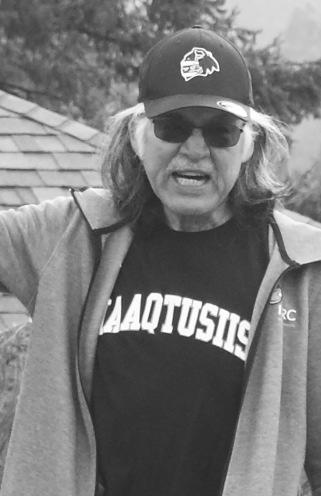
of the more experienced dancers. “I just think it’s like a really awesome opportunity for people who are not familiar with the nations on the island or even culture traditions, dances, anything like that, because a lot of the groups that we get will actually explain like… this dance is from this person,” said Christoff erson. “Recognizing that dances can’t just be danced by anybody, that they’re specifi c to families and all that kind of stuff . So I think it’s really important for people to recognize the diff erences in Nations and how that can be.” Coff ee, tea, and bannock were served in the morning before the show started, and the Serauxmen grilled burgers to be ready after the Kwakwaka’wakw fi nished their segment. And when the whole thing was over, Christoff erson was not worried about clean up. “When it comes to wrap up, we’re like, hey, if anyone can help put some chairs away, it really wraps up quite quick,” she said. “We really look at it like it’s a potlatch… when we have a potlatch, everybody’s hands on deck. So if you’re asked to do something, doesn’t matter what you are, you get up and you go do it and everything gets done in a timely matter.”
Nuu-chah-nulth Child and Youth Services
September is FASD Awareness Month
The FASD awareness initiative began on September 9th, 1999, a date specifi cally chosen to represent the nine months of pregnancy where a woman should refrain from alcohol use. FASD is caused by the use of alcohol during pregnancy. According to Health Canada, FASD is the leading known cause of preventable developmental disability among Canadians. It is estimated that FASD aff ects approximately one percent of the Canadian population. About 95% of people with FASD are also diagnosed with a mental illness. Most alarming, 60% of those with FASD have been charged with, or convicted of a crime.
Overcoming the stigma of FASD is important to ensure early diagnosis and intervention for the success of children aff ected by FASD in school, at play, and in the workforce. Providing a strong support system is important to prevent secondary diffi culties related to FASD such as disrupted school experience, inappropriate sexual behaviour, substance abuse, problems with employment and mental health issues.
For more information online go to: http://www.fasdcoalition.ca/looking-after-each-other-project/mini-documentaries/

• Prenatal alcohol exposure is associated with an increased risk of miscarriage, stillbirth, prematurity and SIDS, as well as a range of lifelong physical, behavioral, and intellectual disabilities • In general, many women can benefi t from exploring the role their partner may or may not have in supporting their decisions around alcohol use during pregnancy. Increasingly, many fathers and partners are expressing interest in fi nding ways to support their partners. Activities to support a healthy pregnancy Ask family members, friends, co-workers and partners to take a pause from drinking to support you in a healthy alcohol free pregnancy. According to new research, a man’s sperm could be responsible for ‘foetal alcohol spectrum disorder’ (FASD), this means it is just as important for a father to avoid alcohol if they are trying to start a family. • join with her to support the changes she is making • care for her, and keep a positive outlook—your strength and optimism can help her feel more positive and create a more nurturing environment for the growing baby • go to prenatal check-ups to support her and ask your own questions • enjoy mocktails with her as a healthy alternative
If you become pregnant, stop drinking alcohol. Every day matters. The sooner you stop drinking, the better for your baby. If you need help stopping, talk to your doctor, contact an addiction specialist or contact Alcoholics Anonymous.
Nuu-chah-nulth Child & Youth Services Offi ces
Southern Region Unit B - 4835 Argyle Street, Port Alberni, V9Y 1V9 Ph: (250) 724-0202, Fax: (250) 720-3693 TF: 1-855-924-0202
Central Region PO Box 279, 151 First Street, Tofi no, V0R 2Z0 Ph: (250) 725-3367, Fax: (250) 725-2158 TF: 1-866-901-3367
Northern Region PO Box 428, 100 Ouwatin Rd, Gold River, V0P 1G0 Ph: (250) 283-2012, Fax: (250) 283-2122 TF: 1-877-283-2012
Facebook Page Nuu-chah-nulth Tribal Council Child and Youth Services





